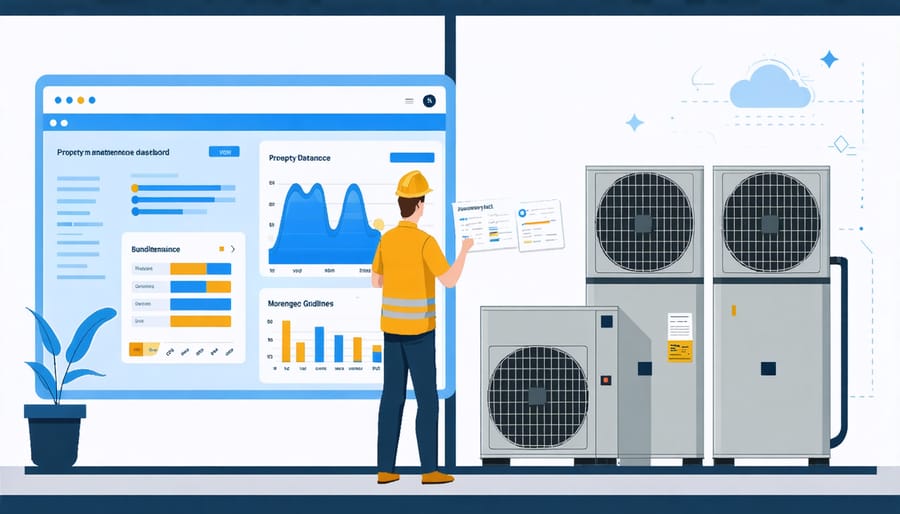Mastering property management demands a rare combination of business acumen and people skills that directly impact tenant experience and property value. Successful property managers demonstrate exceptional financial oversight capabilities, from budget optimization to strategic capital improvements, while maintaining unwavering attention to regulatory compliance and risk management protocols. Their leadership extends beyond mere administrative tasks, encompassing crisis management, vendor relationship cultivation, and the ability to make data-driven decisions that enhance operational efficiency.
The most effective property managers excel in communication across all stakeholders – from investors and board members to maintenance staff and residents – while leveraging technology to streamline operations and improve service delivery. Their proactive approach to maintenance, coupled with strong negotiation skills and market awareness, ensures properties remain competitive and profitable in dynamic real estate environments. These professionals understand that their role directly influences both asset preservation and investment returns, making their expertise invaluable in today’s sophisticated property management landscape.

Communication Excellence: The Foundation of Tenant Relations
Active Listening and Response Time
Active listening and swift response times are cornerstone qualities that distinguish exceptional property managers from average ones. Industry studies indicate that properties with managers who maintain response times under 24 hours experience 40% higher tenant satisfaction rates and significantly reduced turnover.
Effective property managers demonstrate their commitment to tenant concerns by implementing structured communication protocols. This includes maintaining detailed documentation of all interactions, setting clear expectations for response timeframes, and utilizing property management software to track and prioritize requests systematically.
Professional property managers understand that different situations require varying levels of urgency. Emergency maintenance issues demand immediate attention, while routine inquiries might warrant a 24-48 hour response window. The key is consistently meeting these established timeframes and keeping tenants informed throughout the resolution process.
Beyond just hearing complaints or requests, skilled managers practice active listening techniques, such as paraphrasing concerns back to tenants and asking clarifying questions. This approach ensures accurate understanding of issues and demonstrates genuine engagement with tenant needs.
Regular communication audits and tenant feedback surveys help property managers refine their response strategies and identify areas for improvement in their communication practices.
Multi-Channel Communication Proficiency
In today’s digital landscape, effective property managers must demonstrate proficiency across multiple communication channels to maintain strong relationships with stakeholders. This includes mastering traditional methods like face-to-face meetings and phone calls, while effectively utilizing digital platforms such as email, property management software, and mobile applications.
Professional property managers regularly engage with tenants through instant messaging platforms for quick issue resolution, utilize email for formal documentation and lease-related correspondence, and maintain an active presence on property-specific portals for maintenance requests and community updates. They understand when to leverage each channel based on message urgency and complexity.
Social media management has become increasingly important, as many properties maintain profiles for community engagement and marketing purposes. Property managers must monitor these channels professionally while maintaining brand consistency across platforms.
Emergency communication protocols require managers to implement multi-channel notification systems, ensuring critical information reaches all residents promptly through text alerts, email broadcasts, and mobile app notifications. This systematic approach to communication helps prevent information gaps and reduces response times.
Documentation and tracking of all communications across channels is essential for maintaining accurate records and ensuring accountability. Successful property managers develop standard operating procedures for each communication method while remaining adaptable to new technologies and tenant preferences.
Technical Expertise and Problem-Solving Abilities
Building Systems Knowledge
A successful property manager must possess comprehensive knowledge of building systems and operations to effectively maintain and optimize property performance. This technical expertise encompasses HVAC systems, electrical infrastructure, plumbing networks, and security installations. Understanding these core systems enables managers to make informed decisions about maintenance schedules, identify potential issues before they escalate, and coordinate effectively with maintenance teams and contractors.
Property managers should be well-versed in building automation systems (BAS) and energy management platforms, as these technologies play crucial roles in modern property operations. They must understand how different systems interact and impact overall building efficiency, ensuring optimal performance while managing operational costs.
Critical areas of technical knowledge include:
– Emergency systems and life safety equipment
– Building envelope maintenance requirements
– Energy efficiency measures and sustainability practices
– Mechanical and electrical system operations
– Access control and security protocols
– Preventive maintenance procedures
Beyond basic understanding, property managers must stay current with evolving building technologies and compliance requirements. This includes familiarity with energy codes, sustainability certifications, and smart building innovations. The ability to interpret technical reports, understand maintenance logs, and evaluate system performance metrics is essential for making data-driven decisions that benefit both property owners and tenants.
Regular participation in professional development and technical training ensures property managers maintain their expertise as building systems become increasingly sophisticated and interconnected.

Preventive Maintenance Mindset
A successful property manager recognizes that maintenance isn’t just about fixing what’s broken – it’s about preventing issues before they occur. By implementing proactive maintenance strategies, managers can significantly reduce emergency repairs, extend asset life cycles, and maintain property value.
This preventive mindset requires developing comprehensive maintenance schedules, conducting regular inspections, and maintaining detailed records of all building systems and components. Property managers should establish relationships with reliable contractors and maintain an up-to-date vendor database for swift response when needed. They must also understand the typical lifecycle of building components and plan for replacements before critical failures occur.
Key aspects of preventive maintenance include seasonal HVAC maintenance, regular roof inspections, periodic checking of plumbing systems, and systematic testing of safety equipment. This approach not only reduces long-term costs but also enhances tenant satisfaction by minimizing disruptions to their daily operations.
Modern property managers utilize technology solutions like building automation systems and maintenance management software to track maintenance schedules, monitor equipment performance, and analyze maintenance data. This data-driven approach helps identify patterns, predict potential issues, and optimize maintenance resources effectively.
The return on investment for preventive maintenance is substantial, typically resulting in reduced repair costs, lower insurance premiums, and increased property value over time.

Financial Acumen and Budget Management
Cost Control Strategies
Effective property managers excel in implementing robust cost control strategies while maintaining service quality. They develop comprehensive budgets that account for both routine operations and potential contingencies, regularly monitoring expenses against forecasts to identify and address variances promptly. Strategic vendor management plays a crucial role, with successful managers negotiating favorable contracts and maintaining strong relationships with service providers to ensure competitive pricing.
Preventive maintenance programs form another cornerstone of cost control, as they help avoid expensive emergency repairs and extend the lifespan of building systems. Property managers must also analyze utility consumption patterns and implement energy-efficient solutions to reduce operational costs. This includes conducting regular energy audits and investing in smart building technologies when cost-effective.
Financial reporting and analysis skills are essential, enabling managers to make data-driven decisions about resource allocation. They must balance cost-cutting initiatives with maintaining property value and tenant satisfaction, understanding that excessive cost reduction can lead to decreased property performance and higher vacancy rates. Regular benchmarking against industry standards helps ensure that cost control measures remain competitive while meeting quality expectations.
Value-Add Investment Planning
Effective property managers must demonstrate strong acumen in identifying and executing value-add investment strategies that enhance property performance and tenant satisfaction. This requires a methodical approach to evaluating improvement opportunities, analyzing cost-benefit ratios, and prioritizing projects that deliver maximum return on investment.
Top-performing managers conduct regular property assessments to identify potential upgrades in building systems, amenities, and aesthetic elements. They maintain detailed capital improvement plans that balance immediate needs with long-term value creation, while considering market trends and tenant demands. This might involve modernizing outdated facilities, implementing energy-efficient solutions, or adding amenities that attract and retain quality tenants.
Critical to this process is the ability to develop accurate project budgets, coordinate with contractors, and minimize disruption to existing tenants during improvements. Successful managers also track post-improvement metrics to validate investment decisions and inform future planning, ensuring each renovation or upgrade contributes meaningfully to the property’s overall performance and market position.
Leadership and Team Management
Vendor Relationship Management
A successful property manager excels in cultivating and maintaining strong relationships with vendors and contractors. This involves establishing clear communication channels, setting precise expectations for service delivery, and implementing structured vendor evaluation systems. Professional property managers maintain detailed vendor databases, complete with performance histories, certifications, and insurance documentation.
Key to effective vendor management is the ability to negotiate favorable terms while ensuring quality service delivery. This includes developing standardized service agreements, establishing emergency response protocols, and maintaining transparent pricing structures. Regular performance reviews and feedback sessions help maintain service quality and address any concerns proactively.
Strategic vendor diversification is crucial, maintaining relationships with multiple service providers for each essential maintenance category. This approach ensures continuous service availability and competitive pricing. Successful property managers also implement vendor compliance programs, regularly verifying insurance coverage, licenses, and certifications to minimize liability risks.
Building long-term partnerships with reliable vendors contributes to efficient property operations and tenant satisfaction. This includes establishing clear payment terms, resolving disputes fairly, and recognizing exceptional service through continued business opportunities and referrals.
Staff Development and Motivation
A successful property manager excels at developing and motivating their staff, recognizing that a high-performing team is essential for optimal property operations. This involves implementing structured training programs that enhance both technical skills and soft competencies, ensuring team members stay current with industry best practices and regulatory requirements.
Effective property managers establish clear career progression paths, providing opportunities for advancement and professional growth. They regularly conduct performance reviews, offering constructive feedback and setting achievable goals that align with both individual aspirations and property objectives.
Team motivation extends beyond financial incentives to include recognition programs, mentorship opportunities, and a positive work environment that promotes collaboration. Successful managers foster open communication channels, encouraging staff to share ideas and concerns while maintaining professional boundaries.
Cross-training initiatives prove particularly valuable, enabling team members to develop diverse skill sets while ensuring operational continuity. Property managers should also prioritize work-life balance, implementing flexible scheduling where possible and providing resources for professional development and certification programs.
By investing in staff development and maintaining high team morale, property managers create a stable, efficient workforce capable of delivering exceptional service to tenants and stakeholders.
Regulatory Compliance and Risk Management
A proficient property manager must demonstrate thorough knowledge of local, state, and federal regulations governing real estate management. This includes maintaining compliance with fair housing laws, building codes, safety regulations, and environmental standards. Understanding and implementing proper risk management protocols is crucial for protecting both the property and its stakeholders.
Successful property managers maintain comprehensive documentation systems for all regulatory requirements, inspections, and compliance measures. They regularly conduct property audits to identify potential risks and ensure adherence to safety standards. This includes maintaining up-to-date certificates of insurance, monitoring vendor compliance, and implementing emergency response plans.
Risk mitigation extends beyond regulatory compliance to include financial protection strategies. Property managers must understand insurance requirements, maintain appropriate coverage levels, and effectively manage potential liability exposures. They should also establish clear protocols for handling tenant complaints, maintenance issues, and safety concerns to minimize legal risks.
Staying current with industry regulations requires ongoing education and professional development. Property managers should actively participate in industry associations, attend relevant seminars, and maintain necessary certifications. This commitment to continuous learning ensures they can effectively navigate changing regulations and implement best practices in risk management.
The ability to develop and maintain strong relationships with regulatory bodies, insurance providers, and legal counsel is equally important. These connections provide valuable resources for addressing compliance challenges and managing risk effectively while protecting the property owner’s interests.
The qualities that define an exceptional property manager collectively form the foundation of successful property operations and tenant satisfaction. Through the combination of technical expertise, interpersonal skills, and strategic management capabilities, property managers create environments where both assets and relationships flourish. Their ability to balance financial stewardship with tenant needs directly influences property value and operational efficiency.
Strong communication skills and emotional intelligence enable property managers to build lasting relationships with tenants, vendors, and stakeholders. This translates into higher tenant retention rates, faster problem resolution, and more effective property maintenance. The demonstrated organizational abilities and attention to detail ensure smooth daily operations while maintaining compliance with regulations and lease agreements.
Leadership qualities, particularly in crisis management and decision-making, prove invaluable when addressing unexpected challenges or implementing property improvements. Property managers who exhibit these traits consistently deliver superior tenant experiences while protecting owner interests. Their proactive approach to maintenance, coupled with financial acumen, ensures properties remain competitive in the market while maintaining operational efficiency.
The impact of these combined qualities extends beyond day-to-day operations, creating a positive living or working environment that benefits all stakeholders. When property managers embody these essential attributes, they not only meet but exceed tenant expectations, ultimately contributing to the property’s long-term success and value appreciation. This comprehensive skill set transforms property management from simple administration to strategic asset enhancement.

